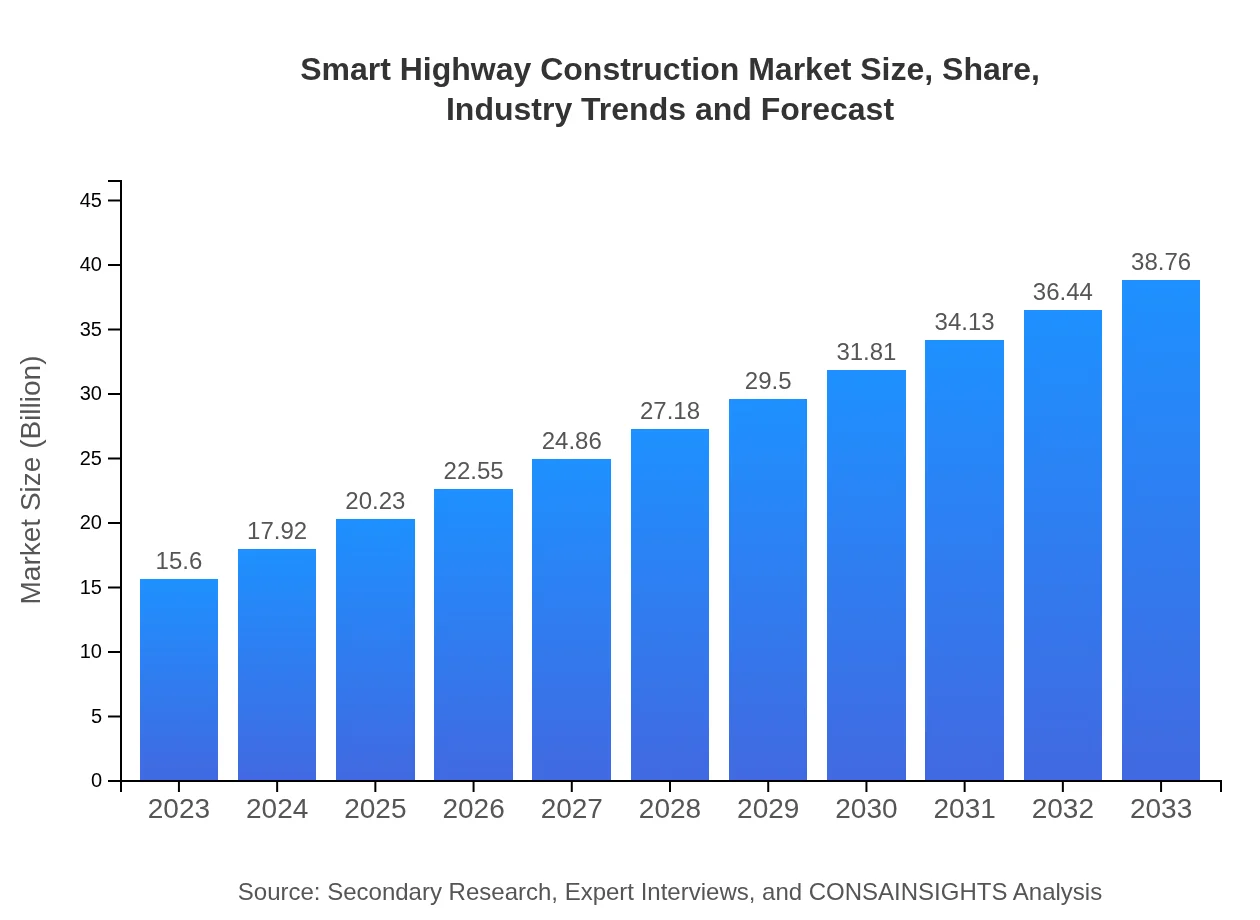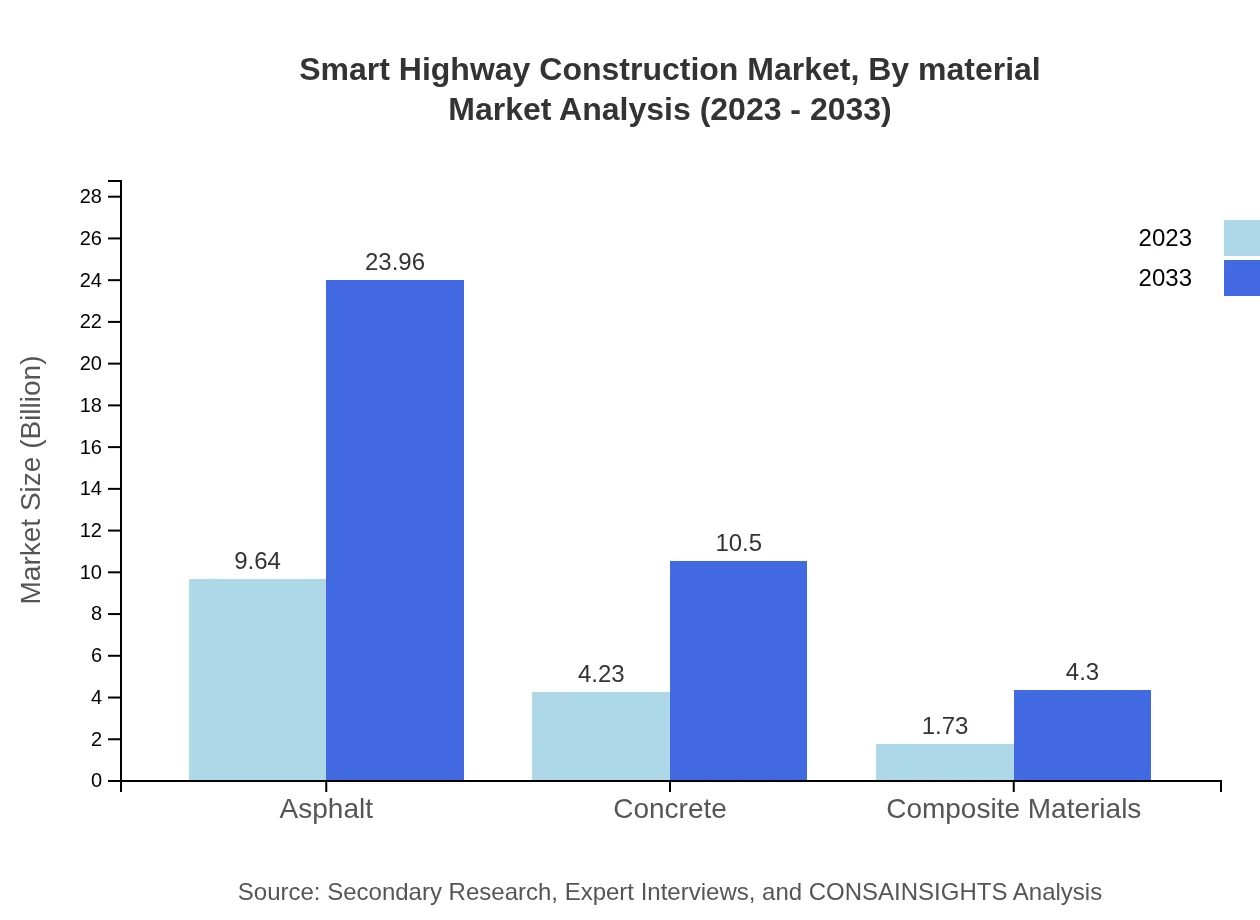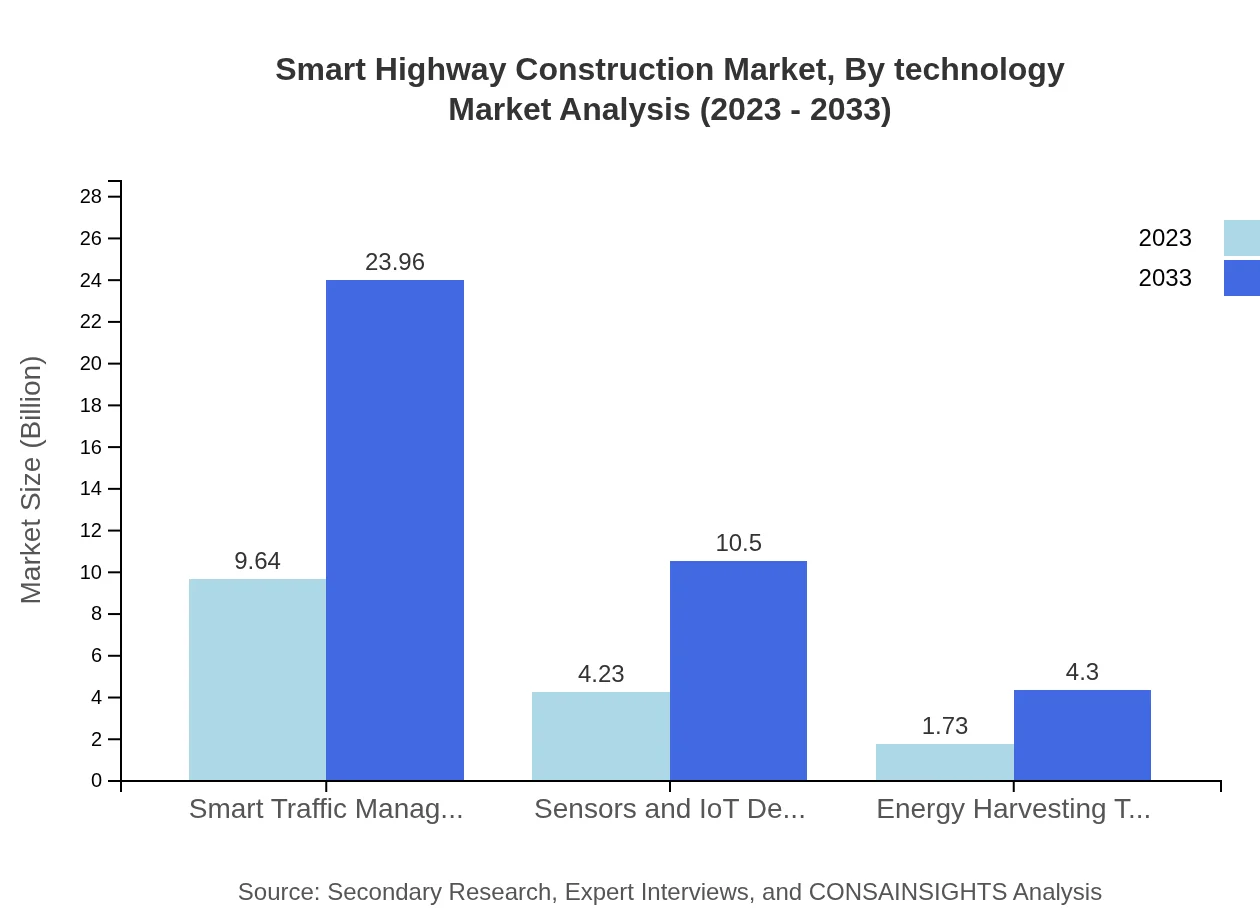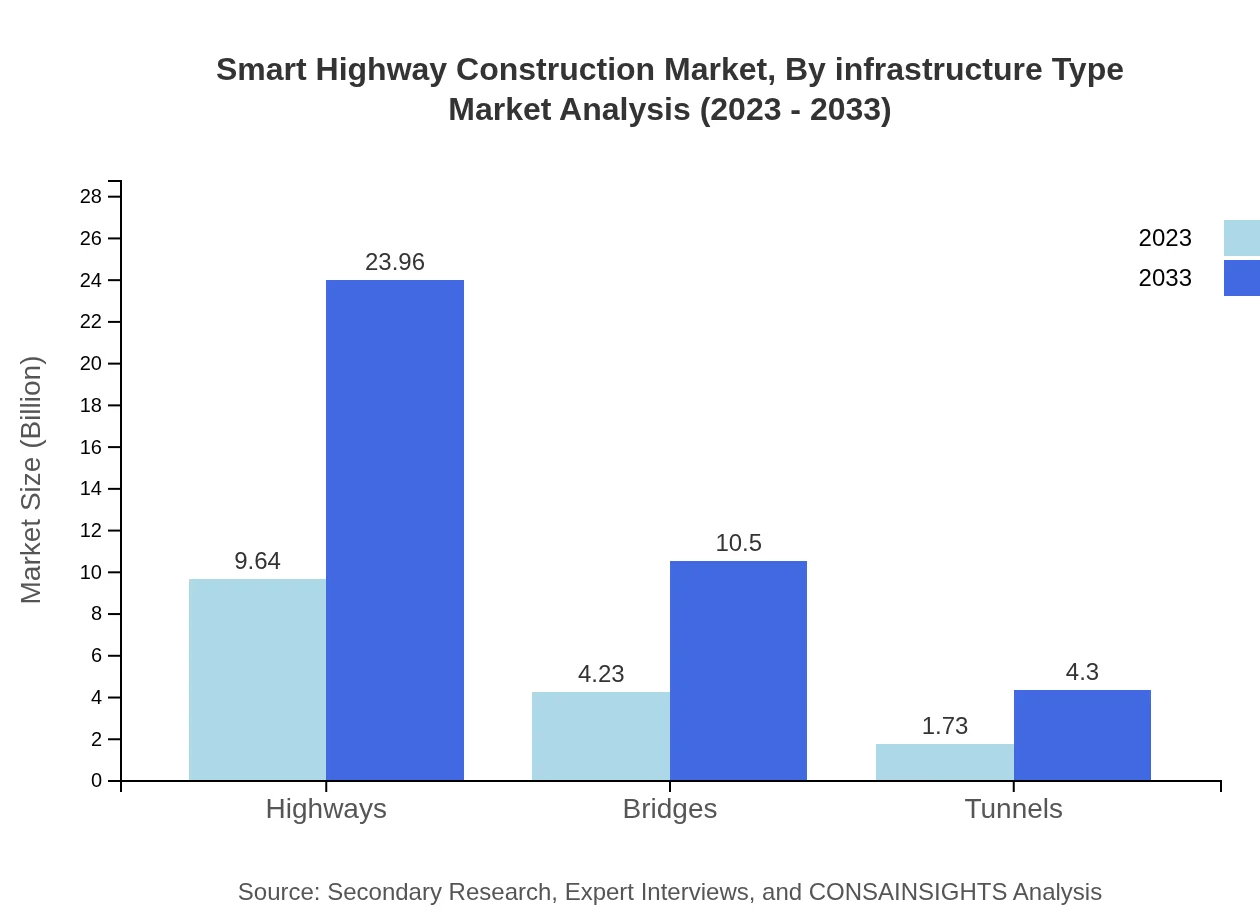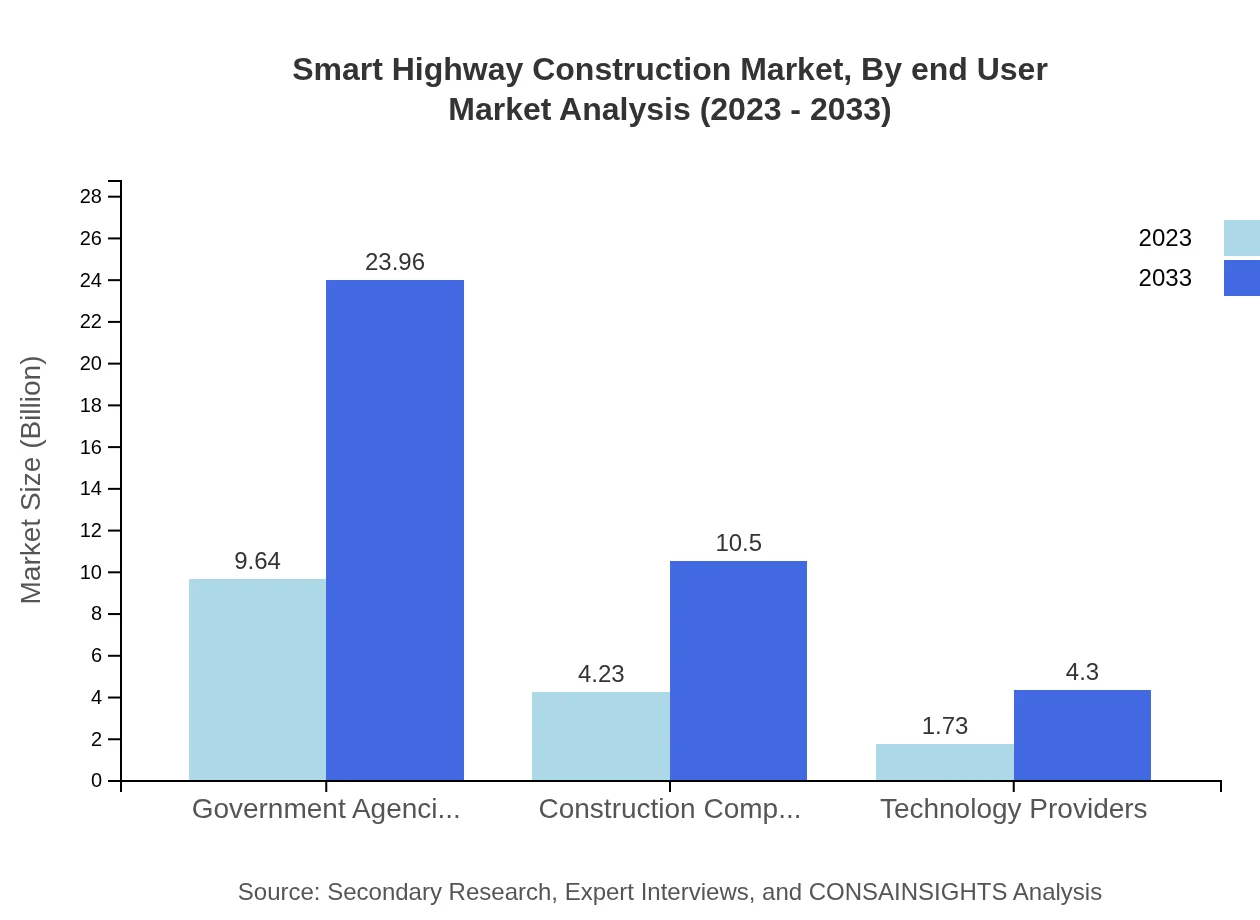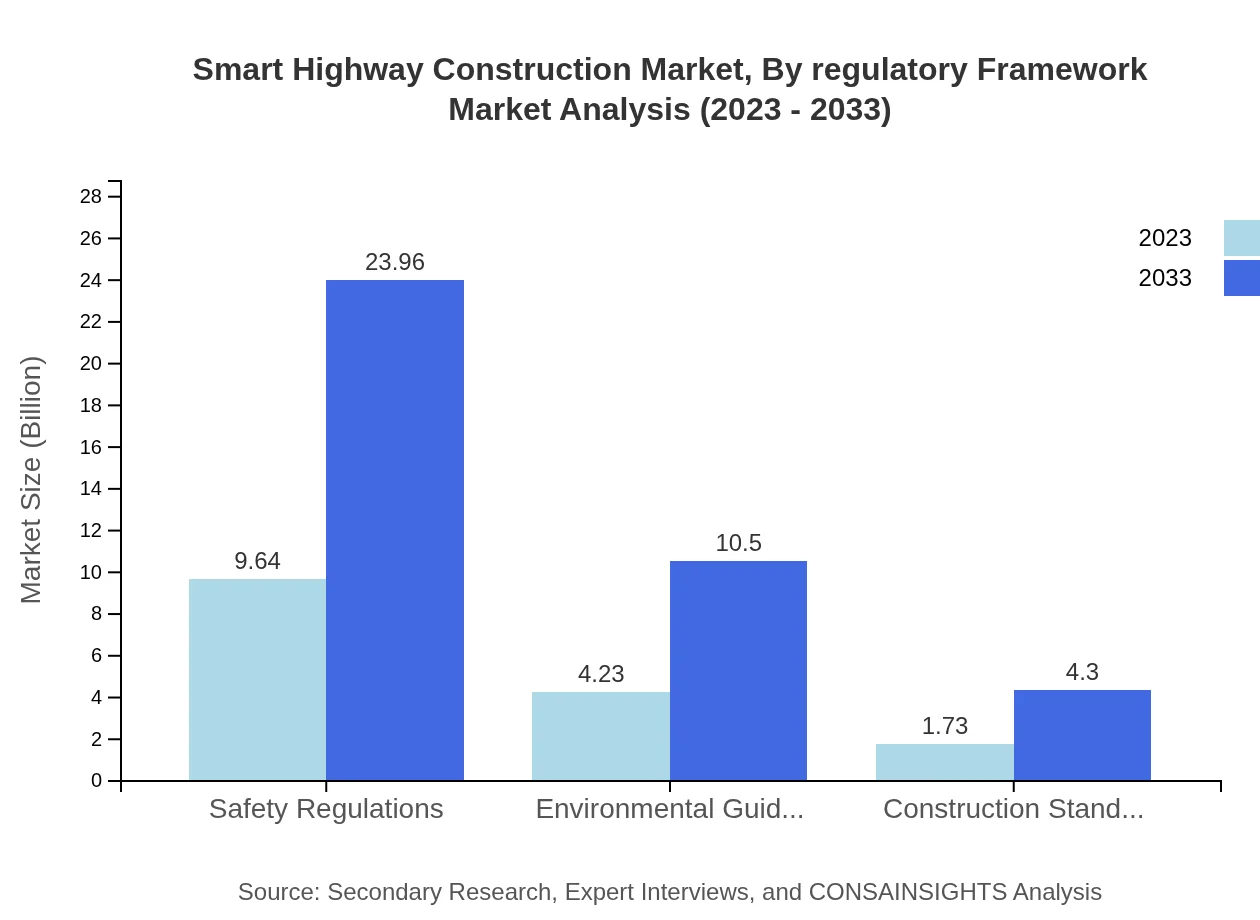Smart Highway Construction Market Report
Published Date: 22 January 2026 | Report Code: smart-highway-construction
Smart Highway Construction Market Size, Share, Industry Trends and Forecast to 2033
This report provides an in-depth analysis of the Smart Highway Construction market from 2023 to 2033, covering key insights, current market conditions, and future trends, including market size and growth forecasts.
| Metric | Value |
|---|---|
| Study Period | 2023 - 2033 |
| 2023 Market Size | $15.60 Billion |
| CAGR (2023-2033) | 9.2% |
| 2033 Market Size | $38.76 Billion |
| Top Companies | Siemens AG, Brookfield Infrastructure Partners, Cisco Systems, Inc. |
| Last Modified Date | 22 January 2026 |
Smart Highway Construction Market Overview
Customize Smart Highway Construction Market Report market research report
- ✔ Get in-depth analysis of Smart Highway Construction market size, growth, and forecasts.
- ✔ Understand Smart Highway Construction's regional dynamics and industry-specific trends.
- ✔ Identify potential applications, end-user demand, and growth segments in Smart Highway Construction
What is the Market Size & CAGR of Smart Highway Construction market in 2023?
Smart Highway Construction Industry Analysis
Smart Highway Construction Market Segmentation and Scope
Tell us your focus area and get a customized research report.
Smart Highway Construction Market Analysis Report by Region
Europe Smart Highway Construction Market Report:
Europe's market, valued at $3.77 billion in 2023, is expected to reach $9.36 billion by 2033. The European Union's ambitious targets for sustainable mobility and smart technology integration in transportation systems propels this growth, particularly in Western European countries.Asia Pacific Smart Highway Construction Market Report:
In Asia Pacific, the Smart Highway Construction market is projected to grow from $3.07 billion in 2023 to $7.63 billion by 2033. This region is witnessing rapid urbanization, increasing vehicle ownership, and significant investments in smart technologies, notably in countries like China, Japan, and India, enhancing the need for integrated transportation systems.North America Smart Highway Construction Market Report:
North America leads with a market size projected to rise from $5.21 billion in 2023 to $12.95 billion by 2033. The region is characterized by high adoption rates of smart technologies, substantial investments in transportation infrastructure, and strong government initiatives toward creating smart cities.South America Smart Highway Construction Market Report:
South America is expected to grow from $1.53 billion in 2023 to $3.80 billion by 2033. Growth in this region is driven by an increasing focus on infrastructure upgrades and improved road safety measures, alongside governmental efforts to modernize public transport systems.Middle East & Africa Smart Highway Construction Market Report:
In the Middle East and Africa, market growth from $2.02 billion in 2023 to $5.02 billion by 2033 is driven by increasing investments in infrastructure projects and initiatives aiming at implementing smart city frameworks, especially in the UAE and South Africa.Tell us your focus area and get a customized research report.
Smart Highway Construction Market Analysis By Material
The Smart Highway Construction Market, segmented by material, identifies asphalt as a dominant segment, with a size of $9.64 billion in 2023 projected to grow to $23.96 billion by 2033. Concrete follows, anticipated to increase from $4.23 billion to $10.50 billion. Composite materials, while currently smaller, are expected to expand from $1.73 billion to $4.30 billion, driven by innovations aimed at improving strength and reducing environmental impact.
Smart Highway Construction Market Analysis By Technology
Technologically, the market is segmented into smart traffic management systems and sensors and IoT devices. Smart traffic management will exhibit growth from $9.64 billion in 2023 to $23.96 billion by 2033. Sensors and IoT devices will mirror this trend with a growth from $4.23 billion to $10.50 billion, highlighting the significant role of technology in enhancing roadway performance and safety.
Smart Highway Construction Market Analysis By Infrastructure Type
Infrastructure types within the Smart Highway Construction market include highways, bridges, and tunnels. Highways dominate the segment, growing from $9.64 billion in 2023 to $23.96 billion. Bridges follow, with an increase from $4.23 billion to $10.50 billion. Tunnels, while smaller, are set to grow from $1.73 billion to $4.30 billion, reflecting the rise of underground mobility systems.
Smart Highway Construction Market Analysis By End User
End-user segmentation highlights government agencies as dominant players, with market sizes of $9.64 billion in 2023 rising to $23.96 billion by 2033. Construction companies represent another significant segment, expected to grow from $4.23 billion to $10.50 billion, as demand for smart materials and technologies rises to enhance project outcomes.
Smart Highway Construction Market Analysis By Regulatory Framework
The Smart Highway Construction market is also assessed based on regulatory frameworks such as safety regulations, environmental guidelines, and construction standards. Safety regulations will maintain a leading position, expanding from $9.64 billion to $23.96 billion, while environmental guidelines and construction standards are projected to grow from $4.23 billion to $10.50 billion, emphasizing compliance in smart construction practices.
Smart Highway Construction Market Trends and Future Forecast
Tell us your focus area and get a customized research report.
Global Market Leaders and Top Companies in Smart Highway Construction Industry
Siemens AG:
A leading player in the smart infrastructure sector, Siemens provides innovative solutions in traffic management, rail systems, and building technologies that promote urban mobility and sustainability.Brookfield Infrastructure Partners:
Focusing on sustainable infrastructure, Brookfield invests in technology-driven construction and operational services necessary for developing smart and resilient infrastructure.Cisco Systems, Inc.:
Cisco offers a range of networking solutions that enable smart connectivity and data management for highways, helping cities optimize traffic flow and safety.We're grateful to work with incredible clients.









FAQs
What is the market size of smart Highway Construction?
The smart highway construction market is projected to reach $15.6 billion by 2033, with a compound annual growth rate (CAGR) of 9.2%. This growth indicates a significant expansion in technologies and innovations related to highway infrastructure.
What are the key market players or companies in the smart Highway Construction industry?
Key players in the smart highway construction industry include major construction firms, technology providers, and government agencies that are leading in advanced infrastructure projects, focusing on innovative and sustainable construction methods to enhance roadway systems.
What are the primary factors driving the growth in the smart Highway Construction industry?
Growth drivers include increased urbanization, rising demand for improved traffic management solutions, advancements in construction technologies, government investments in infrastructure, and the emphasis on sustainable and smart city initiatives.
Which region is the fastest Growing in smart Highway Construction?
The Asia Pacific region is currently the fastest-growing area for smart highway construction, with expected market growth from $3.07 billion in 2023 to $7.63 billion by 2033, fueled by rapid urbanization and significant investments in infrastructure.
Does ConsaInsights provide customized market report data for the smart Highway Construction industry?
Yes, Consainsights offers customized market report data tailored to the specific requirements of clients in the smart highway construction industry, helping organizations obtain insights relevant to their business objectives.
What deliverables can I expect from this smart Highway Construction market research project?
Expect comprehensive deliverables including detailed market analysis, competitive landscape insights, regional forecasts, trend assessments, and strategic recommendations to support decision-making in the smart highway construction sector.
What are the market trends of smart Highway Construction?
Market trends include growing integration of IoT technologies, increasing focus on automated traffic control systems, rising adoption of green materials in construction, and heightened emphasis on safety regulations and environmental sustainability.

